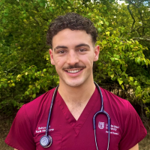Harvey Lew
Reflection: 2025 AMSA National Conference

Harvey Lew
Medical student 3rd year at Charles Sturt University
Attending the AMSA National Convention was a grounding and motivating experience. The atmosphere was one of energy and openness, and it was refreshing to step out of the day-to-day intensity of medical school to connect with students from across the country who share similar challenges, questions, and hopes for our future practice.
The standout session for me was a plenary led by Dr. Pramudie Gunaratne, who spoke powerfully about the NSW psychiatry crisis and the moral imperative for doctors to speak up against systemic injustice. Her reflections on advocacy, leadership, and accountability were deeply resonant—not just in the context of psychiatry, but across the health system. It challenged me to think more seriously about the responsibility we have to use our voice, even early in our careers.
More broadly, the convention was an opportunity to re-engage with medicine beyond the academic. Informal conversations between sessions were full of honesty and insight, from career uncertainty to cultural safety to surviving exams. It reminded me how important it is to maintain peer connection and reflect on what kind of clinician you actually want to become.
This experience left me with a sense of direction and renewed energy. I’ve come away more curious, more grounded, and more determined to stay connected to my values as I move through training. It reaffirmed the kind of medicine I want to practise—human, engaged, and willing to question the status quo, and I couldn't be more thankful to RANZCP and the Psychiatry Interest Forum for this incredible opportunity.
Attending the AMSA National Convention was a grounding and motivating experience. The atmosphere was one of energy and openness, and it was refreshing to step out of the day-to-day intensity of medical school to connect with students from across the country who share similar challenges, questions, and hopes for our future practice.
The standout session for me was a plenary led by Dr. Pramudie Gunaratne, who spoke powerfully about the NSW psychiatry crisis and the moral imperative for doctors to speak up against systemic injustice. Her reflections on advocacy, leadership, and accountability were deeply resonant—not just in the context of psychiatry, but across the health system. It challenged me to think more seriously about the responsibility we have to use our voice, even early in our careers.
More broadly, the convention was an opportunity to re-engage with medicine beyond the academic. Informal conversations between sessions were full of honesty and insight, from career uncertainty to cultural safety to surviving exams. It reminded me how important it is to maintain peer connection and reflect on what kind of clinician you actually want to become.
This experience left me with a sense of direction and renewed energy. I’ve come away more curious, more grounded, and more determined to stay connected to my values as I move through training. It reaffirmed the kind of medicine I want to practise—human, engaged, and willing to question the status quo, and I couldn't be more thankful to RANZCP and the Psychiatry Interest Forum for this incredible opportunity.
